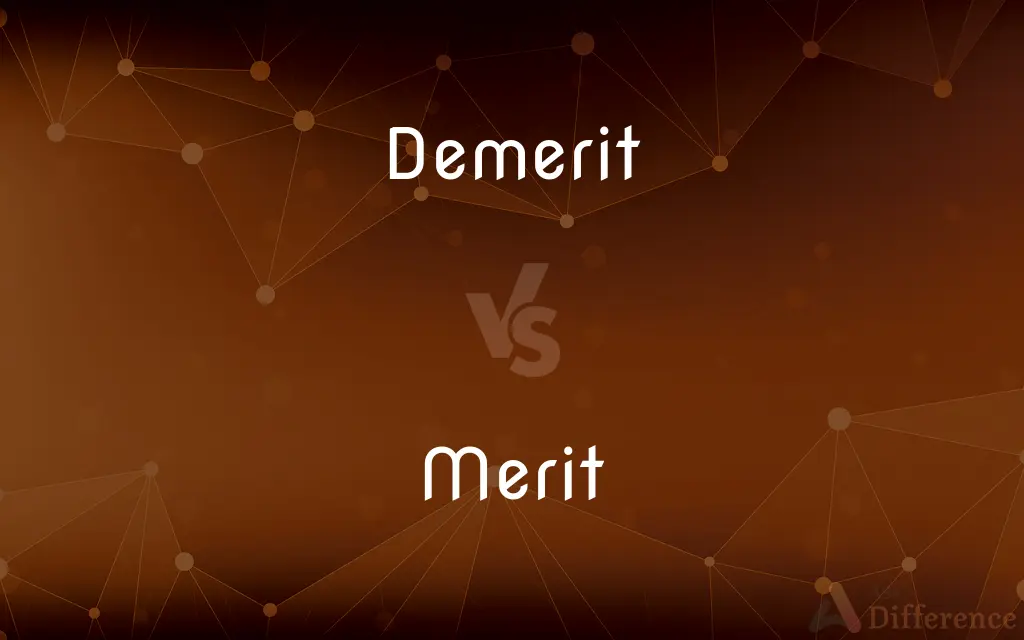Demerit vs. Merit — What's the Difference?
By Maham Liaqat & Fiza Rafique — Updated on March 29, 2024
A demerit is a mark against someone for misconduct or deficiency, while a merit signifies a commendable quality or achievement, highlighting their oppositeness in evaluating performance or behavior.

Difference Between Demerit and Merit
Table of Contents
ADVERTISEMENT
Key Differences
Demerits are often used as a form of penalty or negative recognition, indicating a failure to meet established standards or expectations, such as in academic settings or disciplinary systems. Merits, on the other hand, are awarded as acknowledgment of excellence, achievement, or a positive contribution, serving as incentives for maintaining or improving performance or behavior.
While demerits focus on the negative aspects, identifying areas where improvement is needed or standards have not been met, merits celebrate positive achievements and contributions. This contrast underscores the different approaches in assessing individual or group performance, with demerits aiming to correct or discourage undesirable behavior and merits aiming to encourage and reward desirable behavior.
In many educational and organizational contexts, the concept of demerits is applied to enforce rules and maintain discipline, acting as a deterrent against misconduct. Conversely, merits are used to motivate individuals, recognizing their efforts and successes, which can boost morale and promote a culture of excellence.
The impact of demerits can lead to consequences such as disciplinary action, loss of privileges, or negative evaluations, which can influence an individual’s standing or progression. Merits, however, can result in rewards, privileges, positive evaluations, or advancement, positively affecting an individual's status or opportunities.
The allocation of demerits and merits is often based on clear criteria or standards, ensuring that assessments are fair and objective. While demerits highlight where expectations are not met, merits identify where they are exceeded, providing a balanced approach to feedback and development.
ADVERTISEMENT
Comparison Chart
Definition
A mark against someone for misconduct or deficiency.
A commendable quality or achievement.
Purpose
To penalize or indicate a need for improvement.
To acknowledge excellence or positive contribution.
Focus
Negative aspects or failures.
Positive achievements or qualities.
Context
Often used in disciplinary systems.
Used in recognition and reward systems.
Impact
Can lead to disciplinary action or negative evaluations.
Results in rewards, privileges, or positive evaluations.
Criteria
Based on failure to meet established standards.
Based on exceeding standards or achievements.
Compare with Definitions
Demerit
Can lead to consequences.
Accumulating demerits may result in suspension.
Merit
A reward for good performance.
She earned a merit for academic excellence.
Demerit
A point for a fault or misconduct.
He received a demerit for tardiness.
Merit
Can result in advancement.
Merits contributed to her promotion.
Demerit
Part of disciplinary systems.
The school uses a demerit system to enforce rules.
Merit
Signifies commendable qualities.
His honesty is a merit that everyone admires.
Demerit
Reflects negative behavior or outcomes.
Demerits reflect areas needing improvement.
Merit
Reflects positive achievements.
The merits highlight his contributions to the project.
Demerit
Indicates a deficiency in performance.
Demerits were given for errors in the report.
Merit
Used in reward systems.
The company awards merits for outstanding service.
Demerit
A quality or characteristic deserving of blame or censure; a fault.
Merit
Superior quality or worth; excellence
A proposal of some merit.
An ill-advised plan without merit.
Demerit
Absence of merit.
Merit
A quality deserving praise or approval; virtue
A store having the merit of being open late.
Demerit
A mark made against one's record for a fault or for misconduct.
Merit
Demonstrated ability or achievement
Promotions based on merit alone.
Demerit
A quality of being inadequate; a fault; a disadvantage
Merit
Often merits An aspect of character or behavior deserving approval or disapproval
Judging people according to their merits.
Demerit
A mark given for bad conduct to a person attending an educational institution or serving in the army.
Merit
In various religions, spiritual credit granted for good works.
Demerit
That which one merits or deserves, either of good or ill; desert.
Merit
(Law) The factors to be considered in making a substantive decision in a case, independent of procedural or technical aspects
A trial on the merits.
Demerit
To deserve.
Merit
The factual content of a matter, apart from emotional, contextual, or formal considerations.
Demerit
To depreciate or cry down.
Merit
To earn; deserve.
Demerit
That which one merits or deserves, either of good or ill; desert.
By many benefits and demerits whereby they obliged their adherents, [they] acquired this reputation.
Merit
To be worthy or deserving
Pupils are rewarded or corrected, as they merit.
Demerit
That which deserves blame; ill desert; a fault; a vice; misconduct; - the opposite of merit.
They see no merit or demerit in any man or any action.
Secure, unless forfeited by any demerit or offense.
Merit
(countable) A claim to commendation or a reward.
Demerit
The state of one who deserves ill.
Merit
(countable) A mark or token of approbation or to recognize excellence.
For her good performance in the examination, her teacher gave her ten merits.
Demerit
To deserve; - said in reference to both praise and blame.
If I have demerited any love or thanks.
Executed as a traitor . . . as he well demerited.
Merit
Something deserving or worthy of positive recognition or reward.
His reward for his merit was a check for $50.
Demerit
To depreciate or cry down.
Merit
The sum of all the good deeds that a person does which determines the quality of the person's next state of existence and contributes to the person's growth towards enlightenment.
To acquire or make merit
Demerit
To deserve praise or blame.
Merit
Usually in the plural form the merits: the substantive rightness or wrongness of a legal argument, a lawsuit, etc., as opposed to technical matters such as the admissibility of evidence or points of legal procedure; (by extension) the overall good or bad quality, or rightness or wrongness, of some other thing.
Even though the plaintiff was ordered by the judge to pay some costs for not having followed the correct procedure, she won the case on the merits.
Demerit
A mark against a person for misconduct or failure; usually given in school or armed forces;
Ten demerits and he loses his privileges
Merit
The quality or state of deserving retribution, whether reward or punishment.
Demerit
The quality of being inadequate or falling short of perfection;
They discussed the merits and demerits of her novel
He knew his own faults much better than she did
Merit
(transitive) To deserve, to earn.
Her performance merited wild applause.
Merit
(intransitive) To be deserving or worthy.
They were punished as they merited.
Merit
To reward.
Merit
The quality or state of deserving well or ill; desert.
Here may men see how sin hath his merit.
Be it known, that we, the greatest, are misthoughtFor things that others do; and when we fall,We answer other's merits in our name.
Merit
The quality or state of deserving well; worth; excellence.
Reputation is . . . oft got without merit, and lost without deserving.
To him the wit of Greece and Rome was known,And every author's merit, but his own.
Merit
Reward deserved; any mark or token of excellence or approbation; as, his teacher gave him ten merits.
Those laurel groves, the merits of thy youth.
Merit
To earn by service or performance; to have a right to claim as reward; to deserve; sometimes, to deserve in a bad sense; as, to merit punishment.
Merit
To reward.
Merit
To acquire desert; to gain value; to receive benefit; to profit.
Merit
Any admirable quality or attribute;
Work of great merit
Merit
The quality of being deserving (e.g., deserving assistance);
There were many children whose deservingness he recognized and rewarded
Merit
Be worthy or deserving;
You deserve a promotion after all the hard work you have done
Common Curiosities
What is a demerit?
A demerit is a mark or point given for a fault, misconduct, or deficiency, often used in systems to penalize negative behavior.
What does merit mean?
Merit refers to a commendable quality, achievement, or aspect that is recognized and often rewarded, highlighting positive contributions.
How are demerits and merits used in schools?
In schools, demerits are used to penalize misconduct or poor performance, while merits reward good behavior, achievements, or high performance.
How do merits benefit an individual?
Merits can benefit an individual by leading to rewards, recognition, positive evaluations, and sometimes advancement or privileges.
Do all organizations use a merit and demerit system?
Not all, but many organizations use some form of merit and demerit system to encourage desired behaviors and discourage undesirable ones.
Can demerits affect one's career?
Yes, demerits, especially in professional contexts, can negatively impact one’s career through disciplinary actions or negative evaluations.
How do merits influence teamwork?
Merits can positively influence teamwork by encouraging members to contribute positively and strive for collective achievements.
Are demerits always formal?
While demerits are often formalized in certain systems, informal demerits can also occur through negative feedback or informal penalties.
What role do merits play in motivation?
Merits play a crucial role in motivation by recognizing and rewarding positive behavior and achievements, encouraging further excellence.
Can someone receive both demerits and merits?
Yes, an individual can receive both demerits and merits, depending on their actions and performance in various situations.
What impact do demerits have on student behavior?
Demerits can impact student behavior by discouraging misconduct and encouraging adherence to rules through the fear of negative consequences.
Can demerits be appealed?
In some systems, there may be a process to appeal demerits, especially if the demerits are believed to be unjustly assigned.
Is a demerit system effective in discipline?
A demerit system can be effective in discipline if it is fair, transparent, and part of a comprehensive approach to behavior management.
How does one earn merits?
One earns merits by exceeding expectations, achieving set goals, or demonstrating qualities valued by the awarding system or organization.
How are merits awarded?
Merits are awarded based on criteria such as performance, achievement, or displaying commendable qualities, often through a formal recognition process.
Share Your Discovery

Previous Comparison
Rejuvenate vs. Refresh
Next Comparison
Streaming vs. BroadcastAuthor Spotlight
Written by
Maham LiaqatCo-written by
Fiza RafiqueFiza Rafique is a skilled content writer at AskDifference.com, where she meticulously refines and enhances written pieces. Drawing from her vast editorial expertise, Fiza ensures clarity, accuracy, and precision in every article. Passionate about language, she continually seeks to elevate the quality of content for readers worldwide.















































